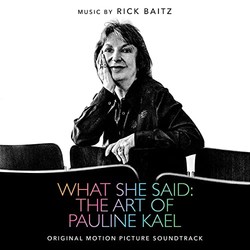What She Said: The Art Of Pauline Kael
Stay better informed and get access to collectors info!
| # | Track | Duration | |
|---|---|---|---|
| 1. | Opening | 1:38 | |
| 2. | Montage / Hud / 30’s Girls / Christopher Strong | 6:24 | |
| 3. | 30’s College Dating / Pauline’s Love of Books/Pauline’s Struggles | 3:12 | |
| 4. | Charlie Chaplin | 0:25 | |
| 5. | Dance of Death | 1:16 | |
| 6. | Bullfight | 1:11 | |
| 7. | The Auteur Theory | 2:34 | |
| 8. | Marriage | 0:41 | |
| 9. | Pauline Comes to New York | 1:08 | |
| 10. | Pauline’s House Murals | 4:05 | |
| 11. | Pauline Arrives at The New Yorker / William Shawn | 3:25 | |
| 12. | Pauline’s Generosity | 1:29 | |
| 13. | Pauline at the Movies / Working With Gina | 2:12 | |
| 14. | Godard | 2:00 | |
| 15. | Nashville | 1:49 | |
| 16. | The Exorcist / Great Barrington House | 2:09 | |
| 17. | DePalma | 1:12 | |
| 18. | Woody Allen | 0:37 | |
| 19. | Casualties of War | 2:05 | |
| 20. | The End | 4:02 | |
| 43:34 |
What She Said: The Art of Pauline Kael
Added on Saturday, December 05, 2020
Rick Baitz releases a soundtrack album for the documentary What She Said: The Art of Pauline Kael. The album contains his score from the film and is released digitally on December 11, 2020.
Rick Baitz releases a soundtrack album for the documentary What She Said: The Art of Pauline Kael. The album contains his score from the film and is released digitally on December 11, 2020.
What She Said: The Art of Pauline Kael is directed by Rob Garver and tells the story of New Yorker film critic and best-selling author Pauline Kael who battled to make her mark – fueled by brilliance, unshakable self-confidence, a complicated past, and a deep love of the arts.
Pauline is voiced by Sarah Jessica Parker, and participants include Quentin Tarantino, Camille Paglia, David O. Russell, Molly Haskell, Francis Ford Coppola, and daughter Gina James.
Pauline Kael (1919-2001) was likely the most powerful, and personal, movie critic of the 20th century. Writing for The New Yorker and publishing a dozen best-selling books, she ruthlessly pursued what made a movie or an actor’s performance work, or not, and why. Her passion made her both admired and despised amongst her readers and her subjects. Pauline’s own story is one of struggle and obsession: the fight to establish her voice and have it heard, and to raise a daughter on her own in a time when the obstacles were high. The latter golden age of movies of the 1960s and 1970s are the focus of this film that pursues the question of what made Pauline Kael’s work so individual, so controversial — and so damned good.
Visit Juno Films
More info at: Official movie website Juno Films



